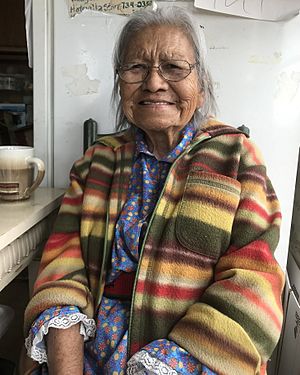Dextra Quotskuyva facts for kids
Quick facts for kids
Dextra Quotskuyva Nampeyo
|
|
|---|---|

Photo of Dextra Quotskuyva taken on September 20, 2018, in Kykotsmovi, Arizona.
|
|
| Born | September 7, 1928 |
| Nationality | American |
| Education | Great-granddaughter of Hopi–Tewa potter Nampeyo |
| Known for | Potter and artist |
| Awards | Proclaimed an "Arizona Living Treasure," 1994; Arizona State Museum Lifetime Achievement Award, 1998 |
Dextra Quotskuyva Nampeyo (born September 7, 1928, in Polacca, Arizona) is a famous Native American potter and artist. She comes from a long line of talented Hopi potters, being the fifth generation in her family to create beautiful pottery.
Dextra Quotskuyva has received many important awards for her art. In 1994, she was named an "Arizona Living Treasure." This award honors people who have made a big difference in Arizona. In 1998, she was given the first-ever Lifetime Achievement Award from the Arizona State Museum. Later, in 2004, she also received a Lifetime Achievement award from the Southwestern Association for Indian Arts. Her pottery was even featured in a special exhibition at the Wheelwright Museum in 2001, showing her work from the past 30 years.
Her Artistic Family
Dextra is the great-granddaughter of a very famous potter named Nampeyo of Hano. Nampeyo was a Hopi-Tewa artist who helped bring back an old style of pottery called Sikyátki style. This means Dextra's artistic talent runs deep in her family!
Dextra's grandmother was Annie Healing, Nampeyo's oldest daughter. Her mother, Rachel Namingha (1903–1985), was also a well-known Hopi-Tewa potter. Dextra's sister, Priscilla Namingha, also creates pottery. The artistic tradition continues with her own children: her daughter, Hisi Nampeyo, is a potter, and her son, Dan Namingha, is a painter and sculptor. Dextra's husband, Edwin Quotskuyva, was a respected leader in the Hopi tribe.
How Dextra Creates Her Art
Dextra started making pottery in 1967. She followed the rich traditions of her great-grandmother Nampeyo, especially using the old Sikyatki designs. At first, her mother told her to stick to the traditional Nampeyo designs, like patterns showing migration or birds.
After her mother passed away in 1985, Dextra felt more free to try new things. She was one of the first Nampeyo potters to create pottery for many people to buy.
Dextra loves to experiment with the materials she uses. She gathers clay from different places on her reservation. This helps her create unique shades of orange, tan, and brown, which are common colors in Hopi pottery fired in bonfires. For the black decorations, she uses a plant called bee-weed. For the red colors, she uses special native clay slips.
She once described her creative process by saying, "One day my pottery calls for me, and then I know this is the day I must do it." This shows how connected she feels to her art.
A book called "Painted Perfection" was written about Dextra by Martha Hopkins Struever. Martha was a well-known art dealer who collected Native American art. The book explored many of Dextra's beautiful works.
More About Hopi Art
- Fannie Nampeyo, another talented potter and daughter of Nampeyo
- Elva Nampeyo (1926–1985), Dextra's aunt and also a potter
- Dan Namingha, Dextra's son, a famous artist and sculptor
- Martha Hopkins Struever, the person who wrote a book about Dextra's art
Where to See Her Work
You can find Dextra Quotskuyva's pottery in several museums and collections, including:
- Lowell D. Holmes Museum of Anthropology at Wichita State University
- Minneapolis Institute of Art
- Nelson Atkins Museum of Art
- National Museum of the American Indian
- Museum of Texas Tech University in Lubbock, Texas
 | Ernest Everett Just |
 | Mary Jackson |
 | Emmett Chappelle |
 | Marie Maynard Daly |

